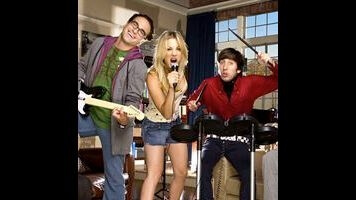The Big Bang Theory gets lost in its own importance

It’s actually hard to believe that The Big Bang Theory is just now arriving at its 200th episode. It feels like the show has been around for ages; the fact that the “hot girl moves across the hall from nerds” setup is both dated and stale at this point (or a long time ago) certainly contributes to that feeling. But seriously, whatever your thoughts on the quality of the show, it’s both a massive institution and a relic of a bygone era. The kind of numbers that the Big Bang Theory pulls on Thursday nights is seemingly out of place, and yet also indicative of a viewership that’s moved away from live viewing and broadcast sitcoms. The Big Bang Theory regularly pulls between 15 and 18 millions viewers a week, which is huge for 2016, and yet those numbers would potentially see the show on the brink of cancelation if it was running on CBS in the 1990s.
All of that’s to say that The Big Bang Theory is an interesting case study in how various people consume TV. The era of #PeakTV may mean that there’s a ton of new content across various platforms, but that doesn’t mean the old guard has completely died out. The fact that The Big Bang Theory does its best numbers during “special” episodes seems to suggest that there’s still a culture of “must watch live” on broadcast networks. So, does that mean that The Big Bang Theory is an outlier, as in it’s appointment viewing in an age where such a thing doesn’t really exist? Not exactly. In fact, “The Celebration Experimentation” suggests that, despite what CBS might have you believe, appointment TV is a facade.
Thus, despite whatever storylines the episode actually delivers, “The Celebration Experimentation” is fascinating because of what it is: a statement that 200 episodes still means something, and a trumped up bit of marketing for a show that hardly needs it. While most of the talk in the industry today suggests that having your show talked about and critically well-received is more important than Nielsen numbers, The Big Bang Theory trudges onward, using an Adam West guest appearance to suggest that, somehow, “The Celebration Experimentation” is important, necessary viewing, nine seasons into the show’s run.
When it comes down to it though, “The Celebration Experimentation” is almost indistinguishable from any other episode of the show. The basic premise is the same as it’s always been: Sheldon can’t handle a socially awkward thing, he indulges that thing anyways, he loses his cool when he realizes he can’t handle it, and then he recovers and everything is okay. In “The Celebration Experimentation,” the awkward social thing is his birthday. He vehemently refuses to have a party because his twin sister and her friends tormented him when he was a child. After Amy insists that everything will be fine this year, that he’s surrounded by people that truly care for him, he agrees to let the party happen.
What’s strange about the follow-through is that, after setting up an Adam West cameo, and giving the guest appearance some emotional purpose (Sheldon’s sister played a cruel trick on him when he was younger by saying that Batman was coming to his party), the rest of the episode largely ignores the presence of West. Sure, he gets in a few punchlines, including an inspired bit where all the guys rank their favorite Batman performances, but the reason why he’s there vanishes. Sheldon acknowledges that Adam West is at his party “for some reason,” and then just moves right to the stage of feeling overwhelmed by his party. West doesn’t get another word in until he asks who will drive him home, and that’s a strange choice. Why not allow West to be the emotional crux of the episode, not unlike the way “The Spock Resonance” used Adam Nimoy and the spiritual presence of Spock? It would seem that West is, in fact, used to create that aura of appointment viewing, to hype up the 200th episode of The Big Bang Theory as some sort of achievement.
It’s a shame that “The Celebration Experimentation” fails to follow through with the story of Sheldon never getting Batman at his party though, because much of everything else in the episode clicks. There’s Penny talking to Sheldon about growing up and changing, of the need to put our faith in others despite bad experiences in our past. There’s the extended bit with Stephen Hawking singing “Happy Birthday” and Wolowitz’s toast being unfairly lambasted by Sheldon, because Sheldon can never give him credit for anything. For the most part, “The Celebration Experimentation” works as a low-key episode of The Big Bang Theory, as one of those “hangout” episodes I mentioned in last week’s review. Where “The Celebration Experimentation” suffers though is its own stubborn adherence to a model of the past. The Big Bang Theory still feels the need to treat some its episodes as milestones or achievements, despite the fact that such metrics of value have largely crumbled in this day and age. The result? An uninspired Adam West cameo in an episode that feigns emotional depth and gets lost in its own self-importance.
Stray observations
- “Look at this porcelain skin. I’m like a human sink.”
- “The closest thing I saw to Batman was when a robin flew into the window.”
- “I enjoy marching bands and Tibetan throat music.”
- “Can you hate yourself and frost at the same time?”
- I’ll say it again: GO AWAY KRIPKE.